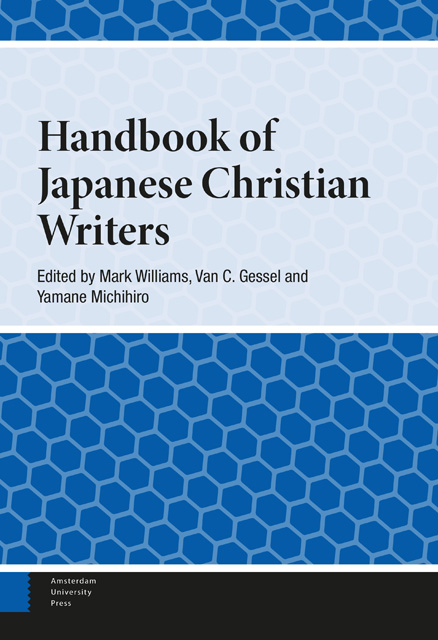Book contents
- Frontmatter
- Contents
- Contributors
- Abbreviations
- Preface
- Introduction
- 1 Prophet of the Inner Life: Kitamura Tōkoku
- 2 Shimazaki Tōson and Christianity: When the Cherries Ripen in the Taishō Period
- 3 Arishima Takeo and Christianity
- 4 Akutagawa Ryūnosuke: A Christian Life
- 5 Incarnation of the Christian Faith in the Poetry of Yagi Jūkichi
- 6 Hori Tatsuo: The Cross Dyed in Bloody Red and the Little Gods of Ancient Times
- 7 Nagai Takashi on Divine Providence and Christian Self-Surrender: Towards a New Understanding of hansai
- 8 Dazai Osamu: His Wrestle with the Bible
- 9 Shiina Rinzō: His Two Visages
- 10 From out of the Depths: Shimao Toshio’s Literary Response to Adversity
- 11 Yasuoka Shōtarō and Christianity: From Postwar “Emptiness” to Religious Longing
- 12 Miura Ayako and the Human Face of Faith
- 13 Endō Shūsaku and the Compassionate Companionship of Christ
- 14 Ogawa Kunio: Renewal of Faith and Identity in His seishomono (Bible Stories)
- 15 Kaga Otohiko: In Search of What Lies Beyond Death
- 16 Sono Ayako: Amor Vincit Omnia
- 17 Takahashi Takako: Drawing Closer to God Through Literature
- Index
- Index of titles
14 - Ogawa Kunio: Renewal of Faith and Identity in His seishomono (Bible Stories)
Published online by Cambridge University Press: 09 June 2023
- Frontmatter
- Contents
- Contributors
- Abbreviations
- Preface
- Introduction
- 1 Prophet of the Inner Life: Kitamura Tōkoku
- 2 Shimazaki Tōson and Christianity: When the Cherries Ripen in the Taishō Period
- 3 Arishima Takeo and Christianity
- 4 Akutagawa Ryūnosuke: A Christian Life
- 5 Incarnation of the Christian Faith in the Poetry of Yagi Jūkichi
- 6 Hori Tatsuo: The Cross Dyed in Bloody Red and the Little Gods of Ancient Times
- 7 Nagai Takashi on Divine Providence and Christian Self-Surrender: Towards a New Understanding of hansai
- 8 Dazai Osamu: His Wrestle with the Bible
- 9 Shiina Rinzō: His Two Visages
- 10 From out of the Depths: Shimao Toshio’s Literary Response to Adversity
- 11 Yasuoka Shōtarō and Christianity: From Postwar “Emptiness” to Religious Longing
- 12 Miura Ayako and the Human Face of Faith
- 13 Endō Shūsaku and the Compassionate Companionship of Christ
- 14 Ogawa Kunio: Renewal of Faith and Identity in His seishomono (Bible Stories)
- 15 Kaga Otohiko: In Search of What Lies Beyond Death
- 16 Sono Ayako: Amor Vincit Omnia
- 17 Takahashi Takako: Drawing Closer to God Through Literature
- Index
- Index of titles
Summary
Ogawa Kunio, one of the most famous Catholic writers in postwar Japan, produced a series of biblical fiction novels (seishomono). His encounter with Christianity influenced his seishomono and impinged on his literary output to a significant degree.
Introduction
Ogawa Kunio (1927–2008), one of the most famous Catholic writers in postwar Japan, created his seishomono, a series of biblically-inspired novels, throughout his literary career. Though little attention has been paid to Ogawa's works in English-speaking academia, the series has been widely discussed in Japanese literary circles—with particular focus on analysis of his usage of Christian motifs, leading to frequent comparisons with the literature of Endō Shūsaku (1923–1996). In contrast to the works of Endō, however, the critic Yamagata Kazumi stated that the issue of indigenization is more “abstracted” in Ogawa's works (Yamagata 1997, 7).1 The issue has captured the attention of novelists and literary critics since the early 20th century in Japan, but Ogawa appears to take a very different approach to writing about faith and Christianity. Endō himself once described the difference between their novelistic approaches to issues of faith as follows: “You walk a hundred meters ahead of me, and I move at a languid pace a hundred meters behind” (Endō et al. 1974, 156). The distance described by Endō is by no means a reference to literary maturity or superiority in creating a Christ figure in literature. Instead, this purported gap suggests that these two authors have different concerns in their approach towards Christianity, and these concerns clearly affect the course of their literary careers. Ogawa's encounter with, and the trajectory of his journey with, the Christian faith are critical in understanding his oeuvre, particularly his seishomono.
This chapter aims to illustrate how Ogawa's encounter with Christianity influences his seishomono and to assess the extent to which this encounter impinges on his literary output.2 In this, the intent is not merely to draw theological implications from the series: to do so would be to risk creating a unique genre of Christian literature in modern Japanese literature.
- Type
- Chapter
- Information
- Handbook of Japanese Christian Writers , pp. 262 - 283Publisher: Amsterdam University PressPrint publication year: 2022



